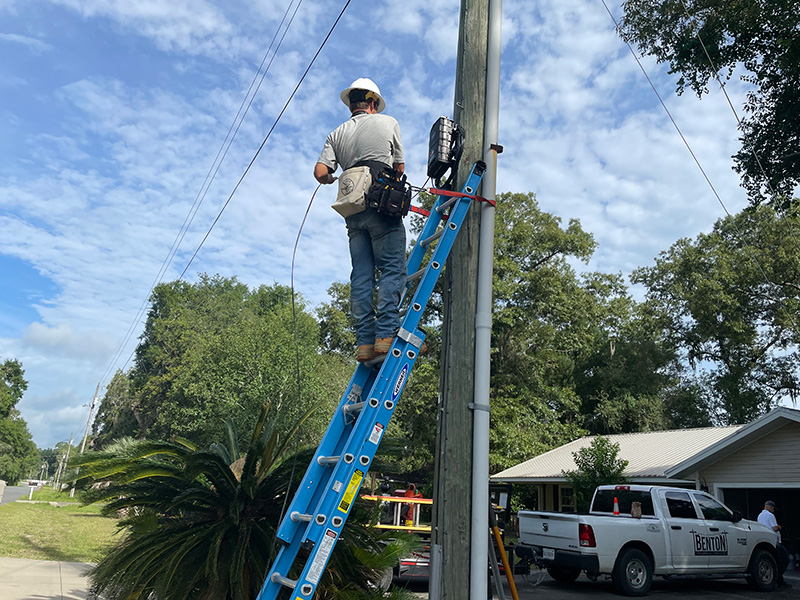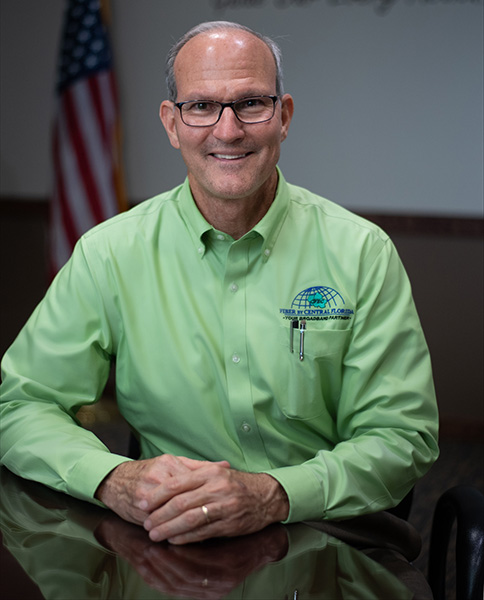Co-op Members
26,000
Total Miles of Fiber
3,000
Project Timeline
2.5 years
Originally published: February, 2024
In the expansive landscape of rural Florida’s tri-county area southwest of Gainesville, Chiefland, Fla.-based Central Florida Electric Cooperative (CFEC) is confronting a daunting challenge – the lack of internet connectivity in its communities. Although the co-op’s territory may not be considered the driest of internet deserts, deteriorating internet and cell phone services left members high and dry when it came to reliable, affordable connection.
CFEC primarily serves Levy, Dixie, and Gilchrist counties, a region primarily made up of residential areas and farming communities. Area growth is largely fueled by outside residents moving into the Sunshine State communities, with limited business development.

Approximately 24 percent of residential users consume less than 500 kW of energy per month, an indicator of financial hardship. In fact, certain areas in CFEC territory represent the lowest economic demographic in Florida with the highest proportion of fixed incomes.
The need for broadband in the CFEC region became increasingly apparent over the past few years with members more and more vocal about their needs. With 36,000 meters, 26,000 members, and a density of only 8 meters per mile, CFEC faced a challenge to bring fiber internet to everyone in need.
But that didn’t stop CFEC General Manager Denny George and the team from knowing a solution needed to be found. CFEC responded to member concerns proactively, engaging in extensive listening sessions, member forums, and even embarking on road trips to learn from fellow co-ops located in Georgia already pursuing broadband. The lessons learned during those co-op visits and conversations during what George terms as “windshield time” were invaluable and sparked the co-op’s initial broadband journey.
As George recalls, it was clear that the co-op’s broadband efforts couldn’t be limited to members only or stop at its territory borders. The entire region was in dire need.
“Community is community,” he emphasized. “We live, work, play and worship together. We couldn’t just bring this for only our members. The need was for everyone.”
In 2022, CFEC embarked on its ambitious broadband project, planning to lay 3,300 miles of fiber circuits at an estimated cost of $100 million. With Conexon’s help, the co-op project timeline was streamlined from an initial projection of over 4 years to a dramatically shortened 2.5 years, demonstrating a commitment to swift and efficient deployment. Buoyed by Conexon’s support and feasibility expertise, the co-op found itself able to extend the build to areas initially not factored into the co-op’s broadband plan, reinforcing CFEC’s dedication to providing equitable broadband access to all. To support its efforts, CFEC successfully secured grants for approximately 15% of the total construction costs.
CFEC’s partnership with Conexon emerged after a thorough evaluation of broadband consultants.
Conexon’s scale, expertise, and established processes were decisive factors in our selection. We chose the strongest horse in the race. Conexon's exacting standards for speed, construction, and overall project management continually impresses our team. The cooperative spirit shared by both [of our] organizations has facilitated a seamless collaboration.”

He explained that Conexon’s consistent ability to meet and exceed CFEC’s “exacting standards for speed, construction, and overall project management” continually impresses their team. “The cooperative spirit shared by both organizations has facilitated a seamless collaboration,” he added.
As if the launch and deployment of a broadband network was not daunting in and of itself, CFEC faced an extreme challenge in the critical first year of operations – Hurricane Idalia. CFEC faced unprecedented damage due to the hurricane at the end of August. More than 250 electric poles were damaged, with more than 22,000 members without power. CFEC is no stranger to hurricane response, but this was the first experience restoring both fiber and electric service simultaneously.
“To prepare, we run mock drills each year. We review the storm plan because people's roles change, people shift duties, some leave, some come,” George said. “Hurricane Idalia was a good test for us because we only got a glancing blow, we were able to effectively execute our storms plans and set the stage for being prepared if ever faced by more powerful storms (and damage).
Amid the chaos caused by the Category 3 storm, CFEC was able to effectively restore both electricity and fiber internet infrastructure to devastated areas.
Within five days from the storm hitting, with assistance from more than 550 contractors, CFEC had resumed its services at nearly full capacity – and were able to send their own workers over to neighboring Tri-County Electric Cooperative and Suwannee Valley Electric Cooperative to assist with restoration services there.
Today, George is confident in the co-op’s ability to meet subscriber and take rate targets. With a focus on safety and scalability, CFEC aims to connect over 5,000 members by the time of their Annual Meeting on the first Saturday of May, 2024. They also look forward to reaching all members (and other-served locations) by middle of 2025.
George's advice for co-op leaders stepping into the broadband arena highlights the need for active engagement and collaborative learning, open communication with peers, and the value of firsthand experiences. “Talk to other co-ops. Those doors are always open,” he said.
George's decisive words resonate as he recalled debating the feasibility of CFEC’s project: "I just knew we couldn't not do it."